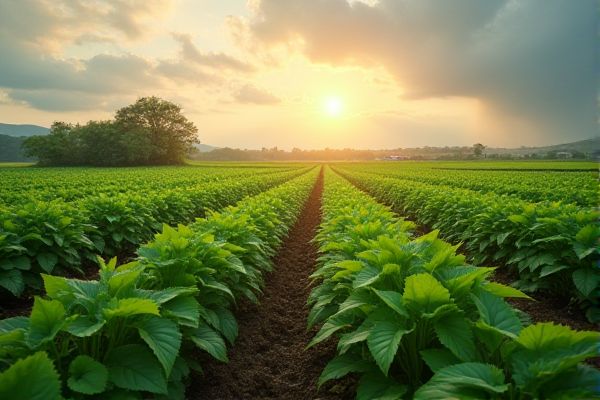
AI technology revolutionizes agriculture through precision farming, enhancing crop yield and reducing resource waste. Machine learning algorithms analyze vast datasets, allowing farmers to make informed decisions about planting, irrigation, and pest control. Drones equipped with AI monitor crop health and soil conditions, enabling timely interventions that improve overall productivity. Automated machinery powered by AI minimizes labor costs while maximizing efficiency in planting and harvesting processes.
AI usage in agriculture and farming
Precision Farming Technology
AI usage in agriculture enhances crop management and resource optimization through precision farming technology. By analyzing data from sensors and drones, farmers can make informed decisions that increase yield and reduce waste. For example, AI can identify areas of a field that require specific interventions, leading to more efficient use of water and fertilizers. This technology presents opportunities for significantly improving overall productivity and sustainability in farming practices.
Crop Health Monitoring
AI can enhance crop health monitoring by analyzing data from sensors and satellite imagery to detect diseases and nutrient deficiencies. Farmers using platforms like Trimble Agriculture can benefit from real-time insights, allowing them to make informed decisions about crop management. This technology offers the potential to increase yields and reduce resource waste, creating a more sustainable farming practice. By leveraging AI, agricultural producers may improve overall productivity and profitability.
Automated Irrigation Systems
Automated irrigation systems can significantly enhance water efficiency in agriculture, reducing waste during periods of drought. By utilizing sensors and real-time data, these systems adjust water distribution based on soil moisture levels, promoting healthier crop growth. Farms implementing such technology, like those at the University of California's Agriculture and Natural Resources, may observe increases in yield and lower operational costs. The potential advantages position automated irrigation as a promising tool for sustainable farming practices.
Yield Prediction Models
Yield prediction models using AI can significantly enhance crop management by analyzing historical data and current conditions. These models help farmers make informed decisions, such as optimizing planting schedules and resource allocation. For instance, an agricultural institution like the USDA utilizes AI to improve yield forecasts for different crop types. Implementing these technologies may lead to increased overall productivity and reduced waste in farming practices.
Livestock Management AI Tools
AI tools in livestock management have the potential to enhance herd health and productivity by monitoring vital signs and behavior patterns. For instance, systems developed by companies like Ceres Tag can track the location and well-being of cattle in real-time. This technology allows farmers to optimize feeding schedules and detect illnesses early, potentially reducing veterinary costs. The integration of AI can lead to improved resource management and increased overall profitability in farming operations.
Pest and Disease Detection
AI technologies are increasingly applied in agriculture for pest and disease detection, enhancing crop management and yield. Farmers can utilize machine learning algorithms to analyze crop images and identify signs of disease early, potentially preventing widespread loss. For instance, institutions like the University of California are developing AI models that accurately predict pest infestations based on environmental data. This proactive approach allows for targeted interventions, reducing chemical usage and improving sustainability.
Remote Sensing and Satellite Analysis
AI can enhance precision in agriculture by analyzing data from remote sensing technologies and satellites. This can lead to improved crop monitoring and yield predictions, offering farmers better management options. For instance, satellite imagery can identify areas of a field that require specific attention, potentially increasing productivity. The chance of optimizing resources such as water and fertilizers is significantly increased with these technologies.
Smart Farm Equipment and Robotics
AI technology in agriculture can enhance crop yield and reduce resource consumption through data analysis and precision farming techniques. Smart farm equipment, such as autonomous tractors and drones, allows for efficient monitoring and management of large fields. The use of robotics in planting and harvesting can minimize labor costs and increase operational efficiency. For instance, the integration of AI-driven systems at institutions like the University of California's Agriculture and Natural Resources program showcases the potential benefits of these innovations in modern farming.
Supply Chain Optimization
AI can enhance crop yield predictions by analyzing data from various sources, such as weather patterns and soil conditions. Implementing machine learning algorithms can optimize supply chains, leading to reduced waste and cost savings for farmers. For example, using AI in a large agricultural institution could streamline inventory management. The possibility of increasing efficiency and profitability through these technologies is significant, offering farmers a competitive edge.
Data-Driven Soil Management
Data-driven soil management utilizing AI can enhance crop yields by optimizing nutrient application based on real-time soil analysis. Farmers can identify specific areas of their fields, like those in a particular region or under a specific crop type, that need targeted interventions. This technology reduces waste and improves efficiency, allowing for more sustainable farming practices. Companies like SoilConnect are offering tools that enable farmers to harness valuable soil data for informed decision-making.
 techknowy.com
techknowy.com